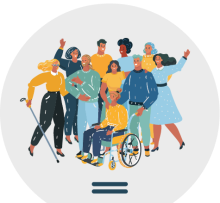COVID-19: Information for Adults in Long-Term Care Programs
This webpage provides information about how you can stay healthy, safe, and connected during COVID-19. People who participate in Family Care, Family Care Partnership, IRIS (Include, Respect, I Self-Direct), and PACE (Program of All-Inclusive Care for the Elderly) can find resources on accessing program services, increased contact with care teams and consultants, and helpful information to consider during the pandemic.
Program services during COVID-19
Face-to-face contacts
In-person contacts with your care team or IRIS consultant can be face-to-face, as long as everyone takes the right steps to stay safe and healthy. For tips on how to get ready for face-to-face contact, see the Working with caregivers resources below.
For Family Care, Family Care Partnership, and PACE, this includes:
- Routine in-person contacts and assessments
- Long-Term Care Functional Screen
For IRIS, this includes:
- Routine in-person contact with IRIS consultant and/or IRIS Self-Directed Personal Care nurse
- Annual Individual Support and Service Plan review
- Long-Term Care Functional Screen
Contact with care team or consultant
If you have questions about services or programs during COVID-19, you should reach out to your care team or IRIS consultant:
- If you are a Family Care, Family Care Partnership, or PACE member, see the managed care organization contact list (PDF) to find out how to contact your care team.
- If you are an IRIS participant, contact the IRIS Call Center at 888-515-4747 to find out how to contact your consultant.
Wisconsin Department of Health Services resources
There are a lot of ways you can stay healthy, safe, and empowered during the COVID-19 pandemic. Use the resources below to learn about:
Vaccine
- Learn about the vaccine through fact sheets and frequently asked questions with information for people in our IRIS and Family Care programs.
Staying connected
- Use your phone, computer, tablet, or smart phone to communicate with your friends or family, care manager or IRIS consultant, coworkers, or participant-hired workers that you usually see every day.
- Access free services if you can’t leave your home.
Your rights
- You have rights that make sure you still have access to support during this time.
- Understand your rights as a member or participant (PDF) so you have a plan to use your rights during COVID-19.
Other resources
The Wisconsin Board for People with Developmental Disabilities (BPDD) has:
- A COVID-19 toolkit (PDF) with tips, forms, and resources to help you stay healthy and plan for your needs.
- Self Determination COVID-19 playlist with five videos that give tips on staying healthy and safe.
- A Healthy, Safe, and Connected toolkit (PDF) with information and tools to keep you living your best life every day, and not just in an emergency.
- Information on how to use and conserve personal protective equipment (PPE) in English (PDF), Hmong (PDF), Somali (PDF), and Spanish (PDF).
Green Mountain Self-Advocates’ guide to COVID-19 has easy-to-understand information about COVID-19 and important information about your rights.
The COVID-19 resources for special educators, therapists, and families is a collection of posters, videos, emergency medical forms, and information to help you and your caregiver deal with COVID-19
The Self Advocacy Resource and Technical Assistance Center’s Plain Language Information on Coronavirus has need-to-know information about COVID-19 in 11 languages.
The Self-Advocacy Resource and Technical Assistance Center's COVID-19 Vaccine Information in Plain Language (PDF) guide has key information about the vaccine.
Disclaimer: The external resources listed on this page do not replace and should not be considered Wisconsin Department of Health Services policy or guidance.




